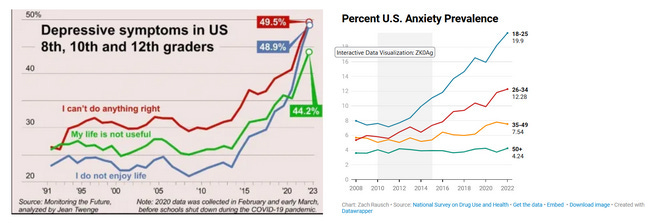The EdTech Paradox: Screens in Schools and the Decline of Learning
From Anxious Generations to AI Tutors: Unpacking Harmful Trends in Education
As an educator and parent, I am excited for all the attention being given to the harms of social media and screen time due to
’s best seller, The Anxious Generation. He provides significant data and research to support his claims and lays out the foundations to help reverse this trend.The move away from a phone-based childhood, creating phone-free schools and restricting social media for children will no doubt have a huge positive impact on our youth.
However, what should not be overlooked is the significant rise of edtech use in schools and its role in the decline of not only test scores and student performance but also the mental health in children.
In fact, when looking back at the data, the trends seem to line up pretty closely.
The following figures demonstrate a connection between the decline in test scores & mental health along with the rise of edtech. This first graph from the NAEP report card (below) shows that reading and math scores for 13 year olds peaked in 2012 prior to when technology began to be infused into education.
2012 marked another shift, the rise in mental health issues in children and teens. The image on the left published in the New York Post demonstrates the rate of depressive symptoms in teens and on the right from The Anxious Generation demonstrating the increased rates of anxiety, both highlight the start of a steep incline that year.
What you can also see in the graph below is an increase in venture funding for educational technology starting in 2012. Since then, technology has been pushed as a way to transform and disrupt traditional learning methods to create “21st century” learners.
The harmful “virtual learning” that was forced on schools during the Covid pandemic only accelerated getting a device into every child's hand, even as young as preschool. Tech companies clearly took advantage of the opportunity, notice the big jump in venture funding in 2021.
Surely, correlation does not mean causation. I don’t pretend to be a social psychologist or sociologist but I am able to think critically and understand what I am witnessing as an educator.
We can no longer ignore what is happening to children when they spend 6 hours of their day at school using “educational” technology.
Haidt recently shared this alarming image on Instagram, especially since schools are contributing to the harmful amount of screen time children are exposed to.
The work to reduce screen time outside of school must also be combined with efforts to reduce screen time in school as well. The use of social media and edtech are not mutually exclusive, in fact they go hand in hand.
Sadly, the EdTech trend shows no signs of slowing based on anticipated future market growth. Without change, I fear the mental health issues will continue to rise right along with the anticipated profits for big tech.
If you think educational technology is not harmful because it is “educational”, think again. Jared Horvath articulates the cognitive challenge that occurs when using a digital device for learning in his article. It’s no wonder that student test scores have been declining since traditional teaching methods have been replaced by digital forms.
More recently, attention has been given to the role that AI might play in education.
As an educator, I am constantly inundated with emails pushing AI learning tools and products that are “transformative” and will help me “improve learner engagement” and “outcomes”.
I don’t buy it.
Recently, Sal Khan, of Khan academy was able to promote his new AI product, Khanmigo, during this glorified infomercial on 60 minutes, Meet Khanmigo: The student tutor AI being tested in school districts. Bill Gates, who significantly funds tech in schools, believes in these AI tutors as well. He is fully behind his buddy Sal, posting on his Gates Notes Sal Khan is pioneering innovation in education…again.
Khan and Gates believe that advanced AI technology can improve education by providing instant and supportive feedback while easing the workload of teachers. In their world, the future of education looks like children online using “personalized” education programs powered by an AI chat bot while a teacher, or rather just an adult, monitors what students are learning.
These tech giants want you to believe this will be revolutionary and children will benefit from it. Just ignore the past 15 years that big tech infiltrated education and students performance deteriorated along with their mental health.
Gates may believe that Sal Khan paints an “inspiring picture of AI in the classroom” but does it more realistically look like this…
The notion that AI is the future of education is not only pushed by tech giants that profit significantly off their products. It is also pushed on newsstands to educators as well.
EdWeek, a news platform for educators which boasts itself as “... America's most trusted resource for K-12 education news and information” even has an entire section dedicated to AI. Recent articles from EdWeek include: This School Will Have Artificial Intelligence Teach Kids (With Some Human Help) and Without AI Literacy, Students Will Be 'Unprepared for the Future,' Educators Say.
It should not be a surprise that the “General operating support for Education Week is provided by the Bill & Melinda Gates Foundation”.
Big tech has large wallets to push their products and dominate the narrative while down playing the negative consequences their products may pose. They are also well aware of the concern that parents are expressing about the harmful effects of screen time and are manipulating language to say educational screen time is not “harmful" or that AI in schools can be “safe”.
Realistically, these tech products require students to spend even more time in front of a screen, negatively impacting their ability to learn and develop critical thinking skills while impeding their social connectedness.
Never mind the amount of data harvesting that AI will require in order for programs to be “personalized”.
Fortunately since the release of the UNESCO report, technology in schools is being looked at with a more critical lens. Countries such as Sweden have recognized the harms and are reversing the course, investing more in paper books than in technology. The Education Minister Lena Johansson states “We’re not abandoning digital tools altogether, but rather ensuring that they complement rather than replace the foundational aspects of learning.”
Since 2012, the push to replace traditional teaching methods with technology has not worked, using AI tutors to replace teachers won’t either. One recent study found that “excessive reliance on AI tools can negatively impact critical thinking skills” and that “Younger participants exhibited higher dependence on AI tools and lower critical thinking scores compared to older participants.“ It seems pretty obvious that when a child’s brain is developing, using tools that reduce their ability to think independently and work through problems will impede their learning and ability to think critically.
Another recent study alarmingly found “What is particularly noteworthy is that AI technologies such as ChatGPT may promote learners' dependence on technology and potentially trigger metacognitive laziness.” This should infuriate parents who hope for a better future and education for their children than they may have had.
Mental health will continue to decline and social emotional skills will not be fostered or developed when children spend hours looking at a computer screen being taught by their “AI personal tutor”.
The stronger humans feel connected to others, the better their mental health outcomes are. In 2014, Dr. Emma Seppala from Stanford wrote “People who feel more connected to others have lower levels of anxiety and depression. Moreover, studies show they also have higher self-esteem, greater empathy for others, are more trusting and cooperative…” Her website highlights a study that revealed “that lack of social connection is a greater detriment to health than obesity, smoking and high blood pressure.” Yet social connection is significantly impacted when a child is staring at a screen and missing critical opportunities needed for healthy brain development and interpersonal social skills.
Over the last decade, big tech has been putting profits well ahead of the interests of children. Now they don’t want teacher’s to worry about their jobs either as they promote these AI tutors. Sal Khan is “pretty confident that teaching-- any job that has a very human-centric element of it is-- as long as it adapts reasonably well in this AI world, they're going to be some of the safest jobs out there.” Sorry, but his confidence is less than reassuring.
It’s not just the loss of teachers jobs to AI that should scare us. It is the loss of humanity and the importance of human connection needed for the developing mind of a child that should. Many of us can think back to our childhood and remember a teacher that had a positive impact in our lives. Mine was my beloved high school English teacher, Mr. Pirrera. He inspired my love of reading and I took every class that he taught. Some of my favorite memories from high school are from his classroom, acting out Greek plays and discussing classics like the Grapes of Wrath. I felt connected to him and his passion for literature, a connection that would have been lost if it were replaced by an AI bot.
The National Education Policy Center has been raising the alarm bells and last March released Time for a Pause: Without Effective Public Oversight, AI in Schools Will Do More Harm Than Good. Their detailed and researched based warnings need to be seriously considered by those that create our education policies. As a society, we shouldn’t be so quick to outsource the education of our children to a computer program.
Ask yourself, do you want an artificial computer program teaching your child or do you want their mind to be supported and developed by genuine human connections?
If you want the latter, we must band together and demand change from our educational policy makers. We must demand that edtech product developers prove that what they are selling is safe and effective.
Our education policy makers need to act for the benefit of children, not big tech. We must undo the grip that big tech has on education. If we follow these three simple steps, we can!
Remove the conflicts of interest in our education system, we can no longer allow supposed “philanthropists” such as Bill Gates, Sal Khan and others with big tech interests to dictate how we educate our children.
Focus on producing uncompromised evidence based research that sets education standards and focuses on educating the entire child. Companies that profit from tech cannot be funding the research to prove its supposed “benefits”.
Reverse the trend of the tech epidemic in schools and remove harmful technology and poorly research digital curricula while bringing back more traditional methods (much like the schools that big tech executives send their kids to) such as books, paper and pencils.
We need to restore schools with the tools that improve learning, not hinder; more teachers, books, pencils, and paper. Once we start to invest in what really matters, I am hopeful for a future with flourishing children. Children that are learning and connecting in a way that humans should.













Children need to learn from humans.
Haidt provides “significant data and evidence”? Where? You mean all the minuscule effects that none of the actual researchers in the field agree with?
Ed tech goes with warehousing children like we do in our current compulsory model. Why don’t you work to disrupt a system that treats children like prisoners rather than promoting bad science and ableism?